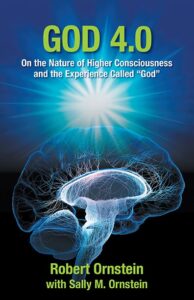The Evolution of Consciousness
The Origins of the Way We Think
New Malor Edition
Robert Ornstein
Illustrated by Ted Dewan

“Ornstein has always been on the frontier of new, speculative thinking about the workings of the mind … No narrow specialist, he uses literature, myth and poetry, not to mention jokes, to describe these ideas so that people without scientific training can grasp them . . .”
—Doris Lessing
Robert Ornstein
Considered one of the foremost experts on the brain, Robert Ornstein was an internationally renowned psychologist and author of more than 20 books on the nature of the human mind and brain and their relationship to thought, health, and individual and social consciousness. He was perhaps best known for his pioneering research on the bilateral specialization of the brain, continually emphasizing the necessity of “conscious evolution” to meet the challenges of the 21st century. He taught at Stanford University, Harvard University and the University of California, San Francisco. His books have sold over six million copies worldwide, have been translated into dozens of languages and used in more than 20,000 university classes. He founded the Institute for the Study of Human Knowledge (ISHK) in 1969 and served as its president until his death in December of 2018.
The Psychology of Conscious Evolution Trilogy:
Ornstein’s trilogy of works, The Psychology of Consciousness, The Evolution of Consciousness and God 4.0, provides a fundamental reconsideration of ancient religious and spiritual traditions in the light of advances in brain science and psychology, exploring the potential and relevance of this knowledge to our shared future.
The Evolution of Consciousness
The Origins of the Way We Think
New Malor Edition
Robert Ornstein
Illustrated by Ted Dewan
“One of those rare books that are so profoundly exciting they raise the hairs on the back of your neck.”
– James Burke
A provocative look at how our mind evolved and what this means for the human future
What is your mind? How is it that, like the proverbial fish in the ocean, we know so little about something that controls every aspect of our individual and collective lives?
Passionate, entertaining and provocative, The Evolution of Consciousness is a fundamental challenge to our assumptions about the human mind and how it works. Ornstein tackles central mysteries of the mind: how the human brain size advanced so quickly; why we dream; how memory works.
Crediting the discoveries of Charles Darwin (whom Ornstein considers the central scientist of modern psychology), he shows how the mind evolved to help us survive—to avoid danger, procure food, and perpetuate the species—not to reason why. Through a panoramic history of the brain and mind’s evolution, he shows that our mind is not rational, but adaptive.
As a result, our mind is a “squadron of simpletons,” unconscious mind shifts geared to survival in a world long gone. Even what we call our “self” is just another of these simpletons with its own limited role and insight. He shows how, by remaining unaware of these mind shifts, we are left vulnerable to misjudgment and indoctrination, both individually and culturally.
With wit and wisdom, he points out that within us all is the potential to go beyond the simpletons. To solve the collective problems of the modern world we need urgently to develop this innate faculty — a perceptive capacity that has been called “higher consciousness” — a new level of understanding reality, a new altruism, in which everyone can take part. It is humanity’s next step.
“Every few years one comes across a book that will change one’s thinking forever, and this is one such book…a most incredible work of synthesis and insight…This could be the first work of a new Bible, read again and again by those looking for a wise and intelligent future.”
– Stuart Whitwell, Booklist
“As Ornstein shows, the successive adaptions of our ‘monkey brains’ help explain not only how we act today but also how we need to approach key problems in our increasingly technological society”
— Thomas W. Malone, author of Superminds: The Surprising Power of People and Computers Thinking Together
“Instructive and entertaining … If your reading experience mirrors mine, you will learn a lot about the brain and how we think. You will also be entertained, challenged, occasionally annoyed, but never bored.”
— Richard M. Restak, The Washington Times





